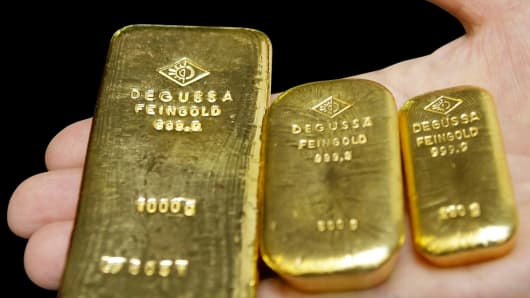After giving investors 12 consecutive years of gains, gold has been anything but golden this year.
Capped by its worst intraday drop in history on Monday, gold prices are now down about $112 ,or 7.5 percent in the past two days. (Read More: How Gold's Fall Will Affect World's Biggest Consumer)
Following Monday's technical breakdown, gold hit a low of $1,321.50 on Tuesday for the first time since Jan. 28, 2011, before bouncing back about 4 percent by midafternoon. Also capturing traders' attention is the precipitous drop from its record close on Aug. 22, 2011, when gold prices settled at $1,888.70.
Deflation fears in the U.S. and worries that Cyprus may sell gold holdings to help with its bailout sent gold falling nearly 5 percent last week, its worst week in 16 months.
(Read More: Here's Why Gold Is Getting Crushed)
The strengthening dollar also has not helped gold, which is priced in U.S. dollars. The Dollar Index has gone up in value nearly 3 percent in 2013, mostly on expectations the Federal Reserve may contemplate tapering stimulus measures later this year.
Gold's steady decline is adding enormous pressure on both gold ETFs and gold stocks in recent months.
Consider the widely held SPDR Gold Trust which traded a record 93.8 million shares on Monday, 8.5 times its average volume this year. Selling also has been intense in the second-largest ETF for weeks. The SPDR Gold Trust has already seen $8.6 billion in outflows this year, far more than any other ETF in 2013, according to IndexUniverse.com.
As a result of those outflows, the SPDR Gold Trust, which is backed by gold, has become a notable seller of the bullion. The ETF is still the sixth-largest holder of gold in the world, with over 1,158 tonnes of the bullion stored in highly secured vaults. However,that's down from its peak holdings of 1,351 tonnes in mid-December.
Since then, the ETF's gold holdings have shrunk by about 193 tonnes.
(Read More: Everything You Need To Know About The Largest Gold ETF)
That's a significant amount. For some perspective, that's more than the gold reserves in countries including Thailand, Singapore, Sweden, South Africa or Mexico—among others. It's also more than the quarterly net-gold purchases made by central banks all around the world during the last two years.
According to the World Gold Council, central bank net purchases of gold never exceeded 161 tonnes in any quarter during 2011 or 2012.
As poorly as gold has performed (down 17 percent year to date), gold stocks have been hit much harder in 2013. Both the CBOE Gold Index, which tracks the major gold stocks, and the Market Vectors Gold Miners ETF plunged over 30 percent so far this year.




